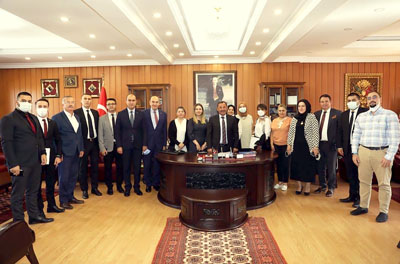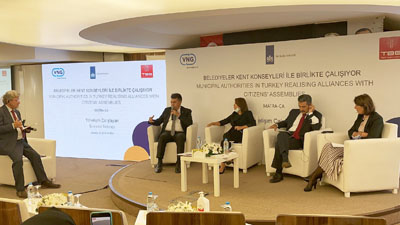Annual Update 2022 VNG International

Courtesy visit to the Mayor of Etimesgut, with the Mayor of Etimesgut, members of Etimesgut Task Force and UMT Team of Trainers

UMT-Task Force Governance Workshops, with Executive panel on consensus building at local level. Participants: Vice Mayor of Etimesgut; Vice Mayor of Keçiören; UMT Secretary-General; Ambassador of The Netherlands. Moderator: Mr. Jean Eigeman, Associated Expert of VNG International
‘MATRA-CA has been very fruitful and enlightening in a way that led us to learn the good examples and experiences of Holland on citizen participation at local level. And of course, it is such a distinguished experience to work with citizens’ assemblies, council members and municipal staff all together for the same purposes.’
Ms. Tuğba EREKEN,
UMT Project and Finance Expert, Member of UMT Team of Trainers
‘The task-force governance workshops were highly useful for our citizens’ assembly. We are conveying the needs and requests of citizens to the municipal management, and we get the problems solved, but we realised that we are not providing feedback to the citizens about what has actually been done to solve the problem. So, we decided to pay more attention to that. For example, we requested the relevant municipal council decisions to be forwarded to the citizens’ assembly.’
Pilot Municipality Task Force Member from Citizens’ Assembly
Involving Citizens in Decision Making by strengthening democratic local government
Featured Project
Turkey, Municipalities Realising Alliances with Citizens’ Assemblies (MATRA-CA)
The origin of citizens’ assemblies in Türkiye lies in the United Nations process since 1992 to promote sustainable development. Building on the experiences of pilot projects, citizens’ assemblies in Türkiye were incorporated in the Law on Municipalities in 2005 to ensure countrywide dissemination of this participatory mechanism.
According to the legislation, citizens’ assemblies shall be established in every municipality within three months following the local elections with the aim of bringing together local stakeholders to identify and discuss the development priorities, problems, and visions of the city, and to develop solutions on the basis of sustainable development. Opinions formed within the citizens’ assembly shall be included in the agenda of the first upcoming meeting of the municipal council, and duly deliberated.
By bringing this longstanding country experience together with the already existing conducive legislation on public participation, and enriching its implementation with Dutch good practices, MATRA-CA aims at improved local governance in Türkiye, and greater public participation in local decision-making processes with the help of procedural participation.
The main objectives of the knowledge and skills transfer on procedural participation methods are activating the existing participatory procedures in the strategic planning and decision-making processes of municipalities by adapting the consensus finding approaches being used in The Netherlands, developing a procedural participation training module for the Union of Municipalities of Turkey (UMT), and supporting UMT in further developing and disseminating these procedural participation methods across Türkiye.
Results achieved:
- An expert team of trainers is established within UMT specialising on procedural participation, and consensus building, thereby strengthening UMT’s service delivery to its members.
- Three pilot municipalities are selected from among the metropolitan district municipalities in Ankara. Each one of the three pilot municipalities has a council majority from a different political party, leading to horizontal exchange of experiences on and approaches to public participation in local decision-making for further dialogue and co-operation.
- Participatory task forces are established in the three pilot municipalities to experiment for the first time a three-dimensional participatory process involving the representatives of the elected municipal council, appointed municipal officials, and representatives of the citizens’ assembly. Task forces hold meetings to review the implementation of the existing participatory mechanisms, identify priority issues, and discuss the decision-making process from different angles. As a result, information flows among different stakeholders are enhanced, and differences in perspectives become more visible, which all together create an environment for meaningful deliberation.
- Three-day governance workshops focused on the international outlook on good governance and public participation, public participation practices in Türkiye and in The Netherlands, the existing legal and institutional framework in Türkiye and possibilities for further improvement. The multi-dimensional dialogue that took place at the workshop provided insight and inspiration for further discussions on improving public participation practices.
- The UMT expert team is directly interacting and co-operating with task forces of pilot municipalities in experimenting with the use of Dutch procedural participation methods, carrying out comparative assessments of various practices, and identifying participatory tools suitable for adaptation and use in the Turkish context.
- The methods and tools necessary for organising effective participatory meetings with relevant stakeholders are being tried and tested with task forces at UMT, and pilot municipalities.
- Pilot task forces started the process for developing participatory policy recommendations with the support and guidance of UMT, and already identified a short list of topics such as those focusing on broader information exchange on municipal activities, environmental protection, combatting addiction, supporting women’s employment, and voluntarism. The participatory policy recommendations that will be formulated by the participatory task forces are expected to be officially submitted to their respective municipal councils by the end of the project.
- A procedural participation module is being developed and will be integrated in the curriculum of the UMT Municipal Academy. It is expected to be used by the UMT expert team of trainers in disseminating the experiences obtained from pilot implementation of procedural participation practices with UMT’s wider network of members.